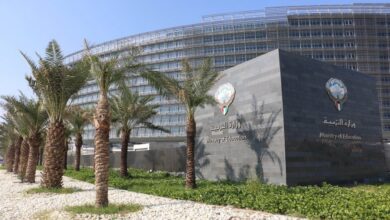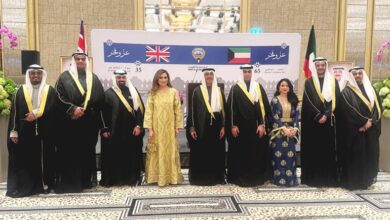IOM commends Kuwait’s efforts in combating human trafficking

On the occasion of World Day Against Trafficking in Persons, observed annually on 30 July, the International Organization for migration (IOM) agency in Kuwait, commended Kuwait’s continued efforts and proactive measures to address human trafficking through a coordinated victim-centric approach.
The global community is marking the World Day Against Trafficking in Persons, this year under the theme, ‘Human Trafficking is Organized Crime—End the Exploitation’. The theme highlights the urgent need to dismantle criminal networks and ensure comprehensive support for survivors.
In a statement issued on the occasion, the Migration Agency noted that human trafficking remains a grave violation of human rights, affecting millions of people worldwide. The statement added that the IOM is committed to combatting this crime through a multifaceted approach encompassing prevention, protection, prosecution, and partnerships.
The State of Kuwait has demonstrated a strong commitment to tackling human trafficking through a comprehensive national strategy for 2025–2028. This strategy focuses on strengthening legal frameworks, implementing a national referral system, enhancing the capacity of enforcement agencies, and fostering regional and international cooperation.
Kuwait has enacted robust counter-trafficking legislation, including Law 91 of 2013, and continues to improve deterrence and enforcement. The establishment of a national referral system ensures that victims receive timely and effective support.
Specialized training is provided to law enforcement and relevant agencies to build their capacity to identify, investigate, and respond to trafficking cases, while cross-border cooperation remains a key pillar of Kuwait’s approach.
“On this World Day Against Trafficking in Persons, we recognize the State of Kuwait’s leadership role in combating human trafficking through its national strategy, legal reforms, and victim-centered protection. The 2025 theme highlights the organized and harmful nature of trafficking. Continued collaboration among government, civil society, and international partners is essential to dismantle trafficking networks and ensure justice and support for survivors. IOM Kuwait remains committed to this mission,” said Mazen AboulHosn, IOM Kuwait’s Chief of Mission.
The fight against trafficking must be anchored in training and coordination. Law enforcement, immigration officials, healthcare workers, and consular staff must be able to detect signs of trafficking and respond with a victim-centered approach.
These national efforts are further amplified by Kuwait’s leadership at the regional level. The successful hosting of the Sixth Government Forum to Combat Human Trafficking in the Middle East, held earlier this year demonstrated Kuwait’s commitment to advancing protection and justice for victims of trafficking. The forum produced key outcomes, including the launch of a unified Gulf digital platform to enhance cross-border information sharing and the initiation of a revised regional strategy focused on labor market reforms and comprehensive victim protection.
IOM Kuwait remains committed to working alongside national and regional partners to implement these outcomes and strengthen coordinated responses aligned with international standards. Around the world, survivors of trafficking are arrested, prosecuted, and jailed for crimes they were forced to commit—ranging from immigration violations to drug smuggling and cybercrime. This misidentification is not only unjust—it actively benefits traffickers by silencing victims and destroying key evidence.












